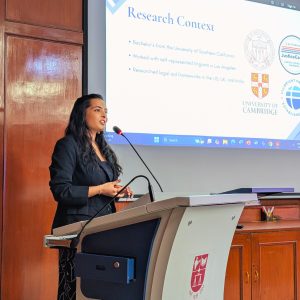NLS Faculty Seminar | ‘Equality in Access: Reviewing India’s Legal Aid Framework’
Conference Hall, Ground Floor, Training Centre
Wednesday, May 7, 2025, 4:00 pm
 In this week’s faculty seminar, Samantha Chacko, a Fulbright-Nehru Scholar affiliated to NLS, presented her paper titled “Equality in Access: Reviewing India’s Legal Aid Framework.” The seminar was held on May 7, 2025, at 4 pm, in the Ground Floor Conference Hall at NLSIU’s Training Centre.
In this week’s faculty seminar, Samantha Chacko, a Fulbright-Nehru Scholar affiliated to NLS, presented her paper titled “Equality in Access: Reviewing India’s Legal Aid Framework.” The seminar was held on May 7, 2025, at 4 pm, in the Ground Floor Conference Hall at NLSIU’s Training Centre.
Abstract
Article 39(A) of the Indian Constitution guarantees citizens access to legal aid. At its core, this Article solidifies each citizen’s right to access justice. Often, the individuals seeking this kind of assistance are litigants preparing for cases addressing critical issues. Without proper access to legal aid, people can lose their homes, families, or livelihoods. In 2022, India’s government-based legal aid program, the National Legal Services Authority (NALSA), reported that only 61% of those who visited legal services clinics throughout India actually received legal assistance. Without proper access to justice, no legal system can be considered just.
There have been few studies that address the gender gap in legal aid services, and even fewer that exclusively focus on accessibility to legal resources and services categorized by demographic. One such study, however, the 2016 DAKSH Access to Justice survey, found that only 14% of all litigants in India are women. There is little explanation for this gender gap in legal participation, and it remains unclear whether women are actually receiving the legal assistance they are constitutionally entitled to and their subsequent ability to navigate the Indian justice system successfully. This research was designed to identify and contextualize the causal factors perpetuating the gender gap in access to justice within the Indian legal aid framework.
Reflections from the Speaker
“It was an honour to present my research at the Faculty Seminar at NLSIU. The faculty feedback was very insightful and will help me develop my paper and future research. I have learned so much as a Fulbright-Nehru Scholar at NLS. I am very grateful to my academic supervisor, Dr. VS Elizabeth, for all her support throughout my grant. Ultimately, I hope this research serves as a foundation for continued awareness about the status of accessibility to justice in India and the USA.”

